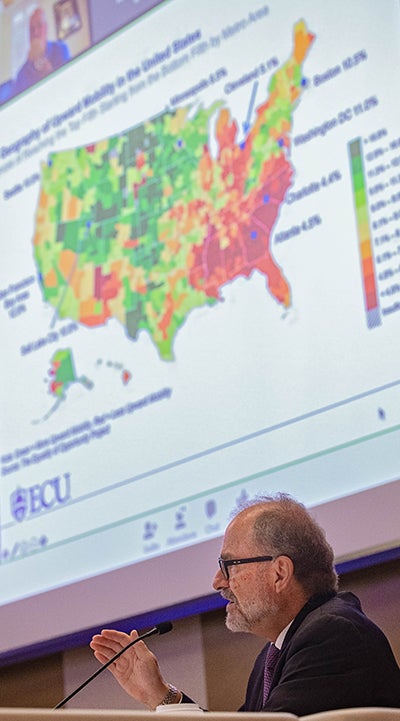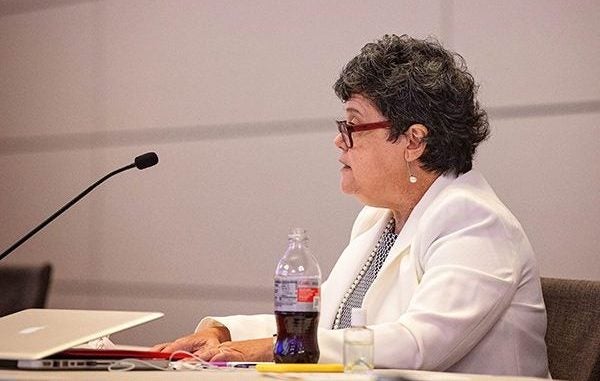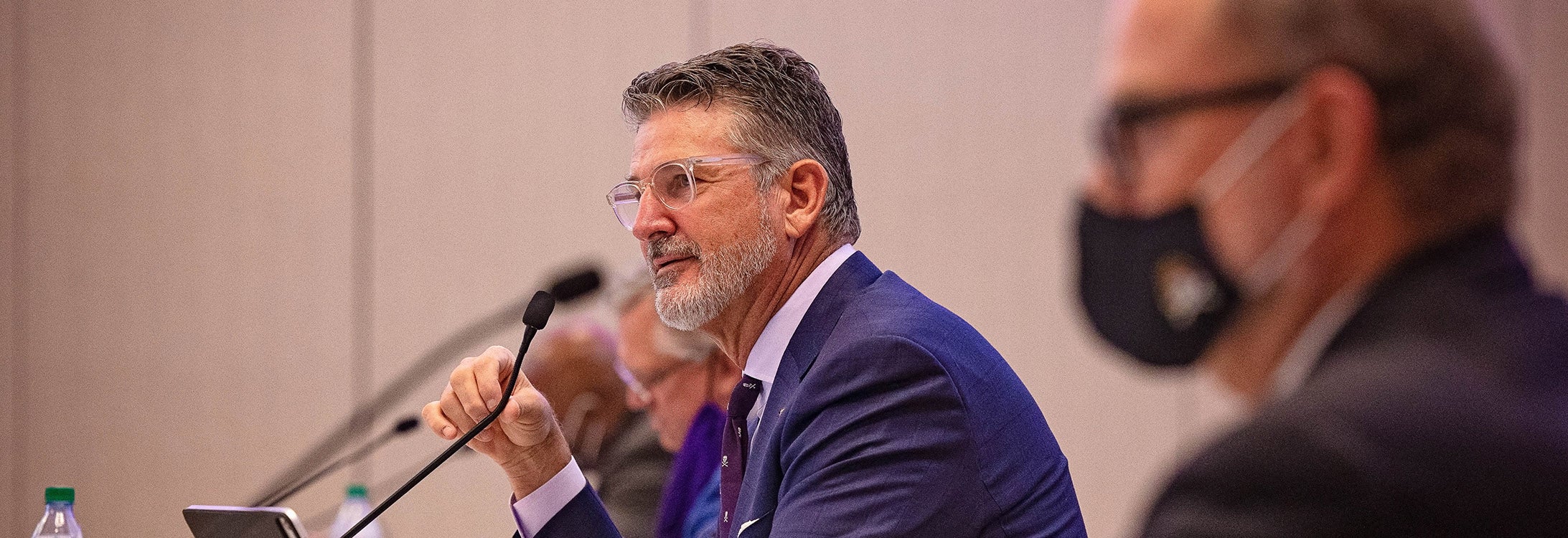THE BOARD IS BACK
Board of Trustees discusses enrollment, coronavirus, future

Interim Chancellor Ron Mitchelson discusses ECU’s impact on upward mobility in eastern North Carolina.
East Carolina University’s Board of Trustees met on campus Thursday and Friday for the first time since the start of the COVID-19 pandemic, with some members spaced out in the Main Campus Student Center ballroom and others joining online.
Much of the meeting centered on the university’s response to the spread of the coronavirus, which resulted in a pivot to online instruction in August.
Interim Chancellor Ron Mitchelson provided an update on the university’s positive test results as well as the global outlook.
“If we hadn’t done what we did with the pivot, I don’t know where we’d be today,” he said. Plans for the spring have not yet been finalized, he added, but it’s clear that “we’re not going to bring people back here at the same level of intensity, at least not on campus, that we have had previously. But we’re going to be open for business; that’s not going to change.”
Student Government Association President Tucker Robbins, Faculty Chair Purificación Martínez and Staff Chair Todd Inman also presented remarks to the board from their respective constituencies.
Sara Thorndike, vice chancellor for administration and finance, updated members on budget matters during the finance and facilities committee meeting.
“We’re being very disciplined in how we’re spending our money,” she said.
Thorndike said reductions in expenses since the spring have been beneficial, and CARES Act funding has resulted in an additional $9 million for the unrestricted fund balance. She anticipates about $14 million in lost revenue from housing and dining refunds this fall, contributing to an overall estimated loss of $25 million in revenue, almost exclusively from auxiliary services.
The use of unrestricted fund balance money will be used to help offset the losses.
“It’s going to be a tight year but very doable,” Thorndike said.
In other business, the board approved the renaming of Spilman 203, a conference room in the administration building, in memory of Steve Showfety of Greensboro, former chair of the Board of Trustees and the ECU Foundation.
During Thursday’s committee meetings:
University Affairs
Acting Provost Grant Hayes reported positive news on enrollment for the fall 2020 semester. Following a record-breaking year in freshman applications, total enrollment is up from last year with a head count of 28,798, marking the third-highest enrollment in ECU history.
Stephanie Whaley, director of undergraduate admissions, updated the committee on the university’s recruitment efforts and adaptations to limitations on in-person recruiting.
The No. 1 worry among high school students, she said, is the financial impact on their families, leading many to consider attending college closer to home. The admissions office has ramped up its virtual recruiting efforts using a variety of software platforms that allow direct communication between potential students and ECU staff and faculty, as well as virtual tours, open houses, college fairs, and high school and community college visits.
Because many students have faced challenges in taking standardized tests, the UNC System has approved a one-year waiver for requiring test scores, and ECU will take a “test blind” approach to admissions, which means “a test score will not negatively or positively affect a student’s admission,” she said. Each student’s application, essay and official high school transcript will be considered during the admissions process.
For transfer students, ECU has adopted a 2.0 minimum GPA requirement, bringing the university in line with other institutions in the UNC System.
Athletics and Advancement
Athletics Director Jon Gilbert said he considers this a “year of survival” from a financial standpoint. He said he is expecting additional departmental furloughs soon and is exploring loss of revenue insurance.
He added that 18 student-athletes are currently in isolation for COVID-19. The football team is being tested once a week, but that will increase to three times a week once the season begins.
Vice Chancellor for University Advancement Chris Dyba reported that the university has received several formal requests to rename buildings on campus. Board of Trustees Chair Vern Davenport recommended Dyba form an ad hoc committee to comprehensively examine all building names to determine any that may be offensive and what further action may be needed. He referenced the renaming of Aycock Residence Hall in 2015 and the university’s use of Heritage Hall as a place to preserve the university’s history.
Interim Chancellor Ron Mitchelson said on the matter, “This is one of the most sensitive issues we can collaborate on. It’s crucial to the institution that we stay close together in this process.”
Finance and Facilities
Bill Bagnell, associate vice chancellor for campus operations, said the steam line replacement on College Hill Drive should be completed by the end of the month.
Joshua Puckett, parking supervisor, updated members on the implementation of the License Plate Recognition System, which uses a camera mounted on a vehicle to read license plates of vehicles parked on campus. Equipment is expected to be installed beginning in November, followed by testing, training and implementation by May. The system is expected to save about $85,500 with the elimination of expenses such as contracted parking security staff and printed decal costs.
Capt. Chris Sutton of the ECU Police Department said 17 students have been referred to the Office of Student Rights and Responsibilities for violations of rules against large gatherings in off-campus locations. He said the Responsible Behavior Initiative, which places an emphasis on individual behavior and ECU’s core values, is designed to educate students rather than punish them. He noted a decrease in the number calls for possible violations by the third weekend of the fall semester.
“We have by far experienced more cooperation than we have experienced non-cooperation,” Sutton said.

Faculty Chair Purificación Martínez shares her report with the ECU Board of Trustees.
Health Sciences
Dr. Mark Stacy, vice chancellor of ECU’s Division of Health Sciences, outlined the impact of the $15 million in CARES Act funding that the Brody School of Medicine received from the North Carolina General Assembly.
“We are looking within our mission. We’re targeting prevention, improving testing and improving treatment, but it is all to better understand the residents of eastern North Carolina because residents of eastern North Carolina may differ a little bit from people elsewhere on Earth and we are responsible for the care of the people in eastern North Carolina — we take that seriously,” Stacy said before identifying specific initiatives the funding would support.
Stacy also emphasized the importance of the public continuing to follow the COVID-19 precautions to keep the rest of the university community safe and to keep the colleges and schools in operation.
“The process and procedures the division leaders developed to ensure the safety of our faculty, staff and learners have been highly effective so far. We’ve seen no disease transmission on the health sciences campus. … We have not seen a single case where we would say it is a transmission in the clinical setting. So, PPE works,” said Stacy, adding this success helped the division’s colleges and schools graduate all of their students who were scheduled to graduate in May.
Dr. Sylvia Brown, dean of ECU’s College of Nursing, told the committee about some of the recent achievements that the college is celebrating, including:
- Record fall enrollment
- The college’s 60th anniversary
- Having multiple specialty areas being ranked in the Top 10 nationally
- Being named a Center of Excellence for Outstanding Achievements in Student Learning and Professional Development for a fourth time.
Nurse anesthesia student Lisa Lashley told the committee about what inspired her to pursue a career in nursing and why she chose ECU’s College of Nursing.
“After rigorously looking at every respectable program in the United States, I further realized how exceptional ECU’s program truly is and applied hoping to experience the remarkable didactic and clinical opportunities that ECU offers,” she said. “I began the nurse anesthesia program in January 2019, and I have been consistently impressed and amazed with the truly world-class program that it is.”
Lashley also discussed what taking part in clinical instruction during the pandemic has been like.
“Overall, I feel very safe — as do my classmates — coming to clinical and class. And I am confident we are doing everything we can to be safe during these times,” she said. “I assure that we in the nursing graduate programs are progressing responsibly. And one day if you or your loved ones need an anesthetic, you can rest assured you will be in expert hands if you have a Pirate anesthetist at the head of your bed.”
The next scheduled meeting of the ECU Board of Trustees will be held Nov. 5-6.
